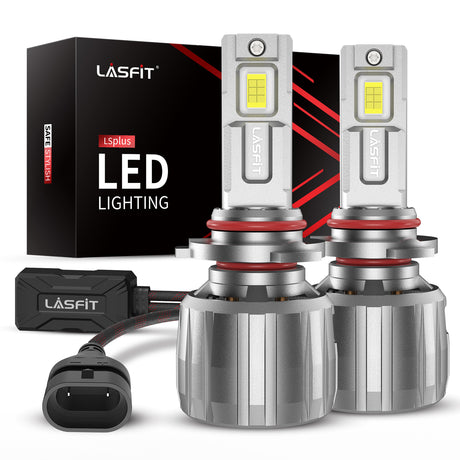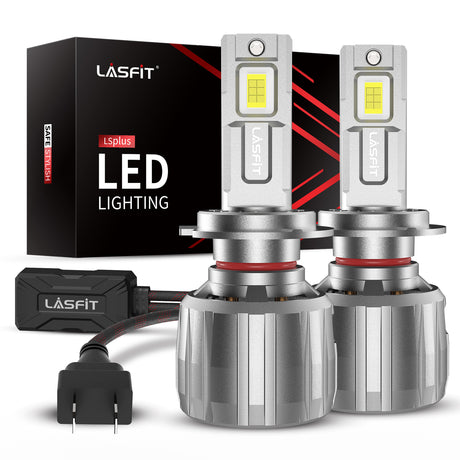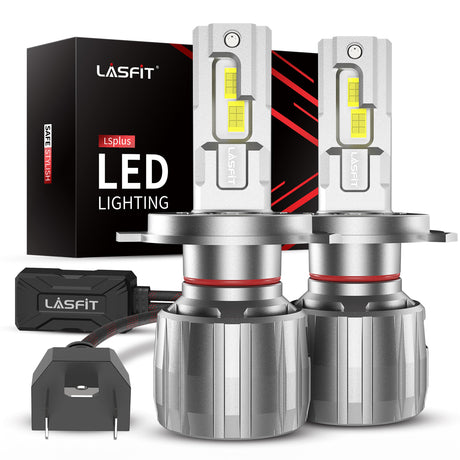LED headlight bulbs have revolutionized automotive lighting, offering drivers superior brightness, energy efficiency, and modern styling compared to traditional halogen or HID bulbs. Whether you're looking to upgrade your vehicle's lighting for better nighttime visibility, enhanced safety, or simply a more contemporary look, understanding LED headlight technology is essential. This comprehensive guide covers everything from how LED bulbs work to their advantages, installation considerations, and how to choose the best LED headlights for your vehicle.
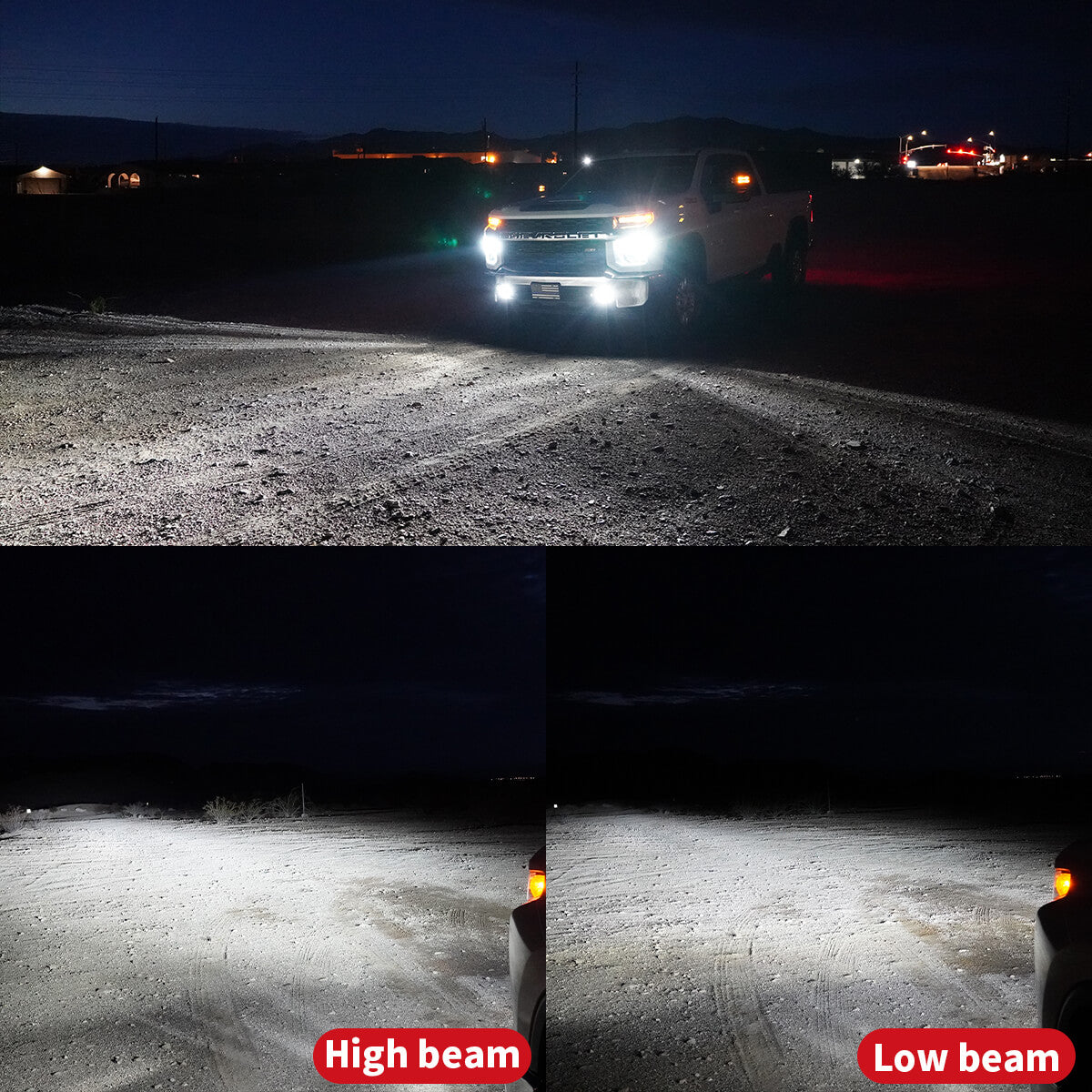
What Are LED Headlight Bulbs?
LED (Light Emitting Diode) headlight bulbs are advanced lighting solutions that use semiconductor technology to produce bright, white light for automotive applications. Unlike traditional halogen bulbs that rely on a heated filament or HID bulbs that use gas discharge, LEDs generate light through electroluminescence - the movement of electrons through a semiconductor material.
LED headlight bulbs have become increasingly popular in recent years due to their numerous advantages:
- Energy efficiency: LEDs consume significantly less power than halogen or HID bulbs while producing more light output
- Long lifespan: Quality LED bulbs can last up to 50,000 hours - far longer than halogen (1,000 hours) or HID (5,000 hours)
- Instant illumination: Unlike HIDs that require warm-up time, LEDs reach full brightness immediately
- Compact design: Their small size allows for flexible installation in various headlight housings
Types of LED Headlight Bulbs
When shopping for LED headlight bulbs, you'll encounter several types designed for different applications:
1. Single Beam LED Bulbs (H1, H7, H11, etc.)
Single beam bulbs like H11 are designed to function as either high beam or low beam, but not both simultaneously. These feature a standardized base (like P14.5s for H1) and are common in many European and Asian vehicles.

Key features of single beam LED bulbs:
- Designed for specific beam functions (high or low)
- Compact size ideal for tight headlight assemblies
- Available in various base types to fit different vehicles
2. Dual Beam LED Bulbs (H4, H13, etc.)
Dual beam bulbs combine both high and low beam functions in a single bulb, using multiple LED chips or movable components to switch between beam patterns. These are common replacements for traditional halogen dual-filament bulbs.
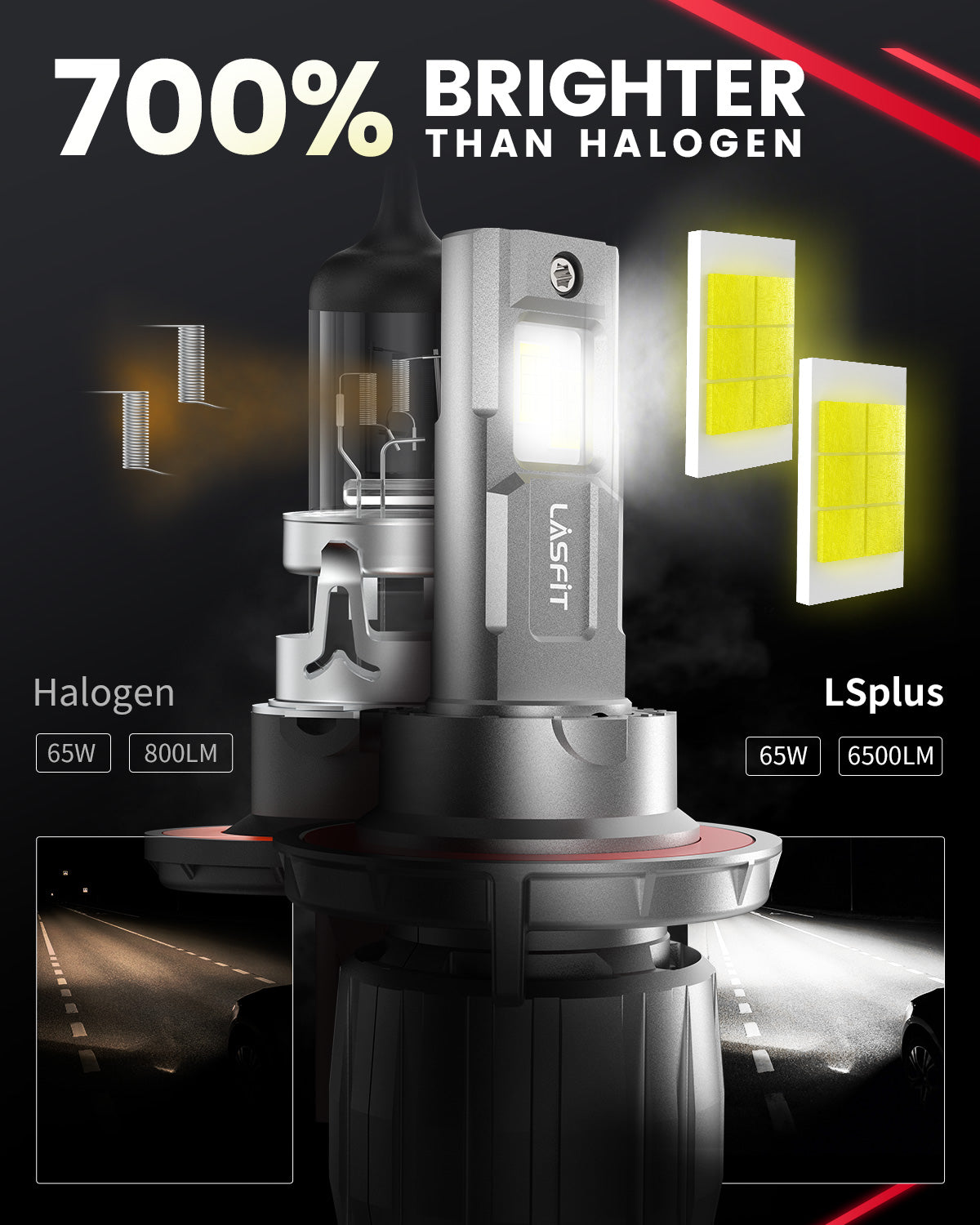
3. Projector-Specific LED Bulbs
Some LED bulbs are optimized for projector headlight housings, featuring precise light patterns that work well with the projector's optics to minimize glare for oncoming drivers 8.
4. CANbus-Compatible LED Bulbs
Many modern vehicles use CANbus systems to monitor bulb function. CANbus-compatible LED bulbs include built-in resistors or circuitry to prevent error messages on your dashboard.
Advantages of LED Headlight Bulbs
1. Superior Brightness and Visibility
LED headlights typically produce brighter, whiter light than halogen bulbs, with color temperatures ranging from 5000K to 6500K - closer to natural daylight. This improves nighttime visibility and reduces eye strain during long drives.
2. Energy Efficiency
LED bulbs consume significantly less power than traditional lighting options. For example, an H4 halogen bulb uses about 55W, while an equivalent LED might use only 20W while producing more light.
3. Long Lifespan
Quality LED headlight bulbs can last up to 50,000 hours - about 5 times longer than HID bulbs and 50 times longer than halogen bulbs. This means fewer replacements and lower long-term costs 68.
4. Instant On/Off
Unlike HID bulbs that require a warm-up period to reach full brightness, LED headlights provide immediate illumination when turned on 2.
5. Durability
LEDs are solid-state devices with no fragile filaments or glass enclosures, making them more resistant to vibration and shock than other bulb types 6.
6. Modern Aesthetic
The crisp white or slightly blueish light of LED bulbs gives vehicles a more modern, high-end appearance compared to the yellowish light of halogen bulbs 1.
Potential Drawbacks of LED Headlight Bulbs
While LED headlights offer numerous benefits, there are some considerations to keep in mind:
1. Higher Initial Cost
Quality LED headlight bulbs typically cost more upfront than halogen or HID bulbs, though their longer lifespan often makes them more economical in the long run 26.
2. Heat Management
LEDs produce less radiant heat than halogens but still generate significant heat at the diode level. Quality LED bulbs incorporate heat sinks or active cooling systems to manage this heat 7.
3. Compatibility Issues
Some vehicles may require additional components like CANbus adapters or anti-flicker modules to work properly with LED bulbs 8.
4. Potential for Glare
Poorly designed LED bulbs or improper installation can cause excessive glare for oncoming drivers. Look for bulbs with proper beam patterns and consider professional installation 68.
How to Choose the Best LED Headlight Bulbs
When selecting LED headlights for your vehicle, consider these factors:
1. Bulb Type and Fitment
First, determine which bulb type your vehicle requires (H1, H7, H11, etc.). Check your owner's manual or use an online bulb finder tool.
2. Brightness (Lumens)
Look for lumens ratings rather than wattage when comparing brightness. Quality LED bulbs typically produce 2,000-4,000 lumens per bulb.
3. Color Temperature
For optimal visibility, choose bulbs in the 5000K-6000K range (pure white with slight blue tint). Higher color temperatures (8000K+) appear more blue but actually reduce visibility.
4. Build Quality and Cooling System
Look for bulbs with:
- High-quality LED chips (like Lumileds or CREE)
- Effective cooling (large heat sinks or fans)
- Durable construction
5. Beam Pattern
Quality LED bulbs should produce a clean cutoff pattern that matches your vehicle's headlight housing (reflector or projector) to minimize glare 8.
6. Brand Reputation and Warranty
Stick with reputable brands that offer warranties of at least 2-3 years 8.
Installation Tips for LED Headlight Bulbs
While LED headlight installation is generally straightforward, there are some important considerations:
- Check compatibility: Ensure the bulbs are designed for your specific make and model
- Consider CANbus adapters: Some vehicles may require these to prevent error messages
- Mind the orientation: Many LED bulbs need to be installed in a specific rotational position for optimal beam pattern
- Allow space for cooling: Ensure there's adequate room for heat dissipation, especially if using bulbs with cooling fans
- Professional installation: For complex setups or if you're unsure, consider professional installation to ensure proper alignment and function 8
Maintenance and Care for LED Headlights
To maximize the lifespan and performance of your LED headlights:
- Avoid touching the LED chips: Oils from your skin can damage the diodes
- Keep connections clean and dry: Prevent corrosion at electrical contacts
- Check alignment periodically: Misaligned headlights reduce visibility and may blind other drivers
- Clean lenses regularly: Cloudy or dirty lenses can significantly reduce light output 9
Common Misconceptions About LED Headlights
-
"More lumens always means better": While brightness is important, beam pattern and color temperature are equally crucial for visibility
-
"All LED bulbs are the same": Quality varies dramatically between brands in terms of components, cooling, and longevity
-
"LEDs don't produce heat": While they run cooler than halogens, heat management is still critical for LED performance and lifespan
-
"Higher color temperature means better visibility": Actually, visibility peaks around 5000K-6000K, with higher temperatures reducing contrast
The Future of LED Headlight Technology
LED automotive lighting continues to evolve with several emerging trends:
- Adaptive LED headlights: Systems that automatically adjust beam patterns based on driving conditions
- Matrix LED technology: Allows precise control of individual LEDs for dynamic lighting
- Laser-assisted LED: Combines LEDs with laser diodes for extreme long-range illumination
- Smart connectivity: Integration with vehicle systems for enhanced functionality
Why Choose LASFIT LED Headlights: Key Features and Innovations
1. High-Performance LED Chips for Superior Brightness
LASFIT’s Pro Series and LSplus Series bulbs utilize high-power automotive-grade LED chips, delivering up to 5,000 lumens per bulb with a crisp 6000K cool white color temperature. These bulbs outperform traditional halogen lights by providing up to 300% brighter illumination, ensuring optimal visibility for nighttime driving57. For example, the LASFIT H11 LED Headlight Kit produces 5,000 lumens per bulb, mimicking natural daylight to reduce eye strain and improve reaction times.
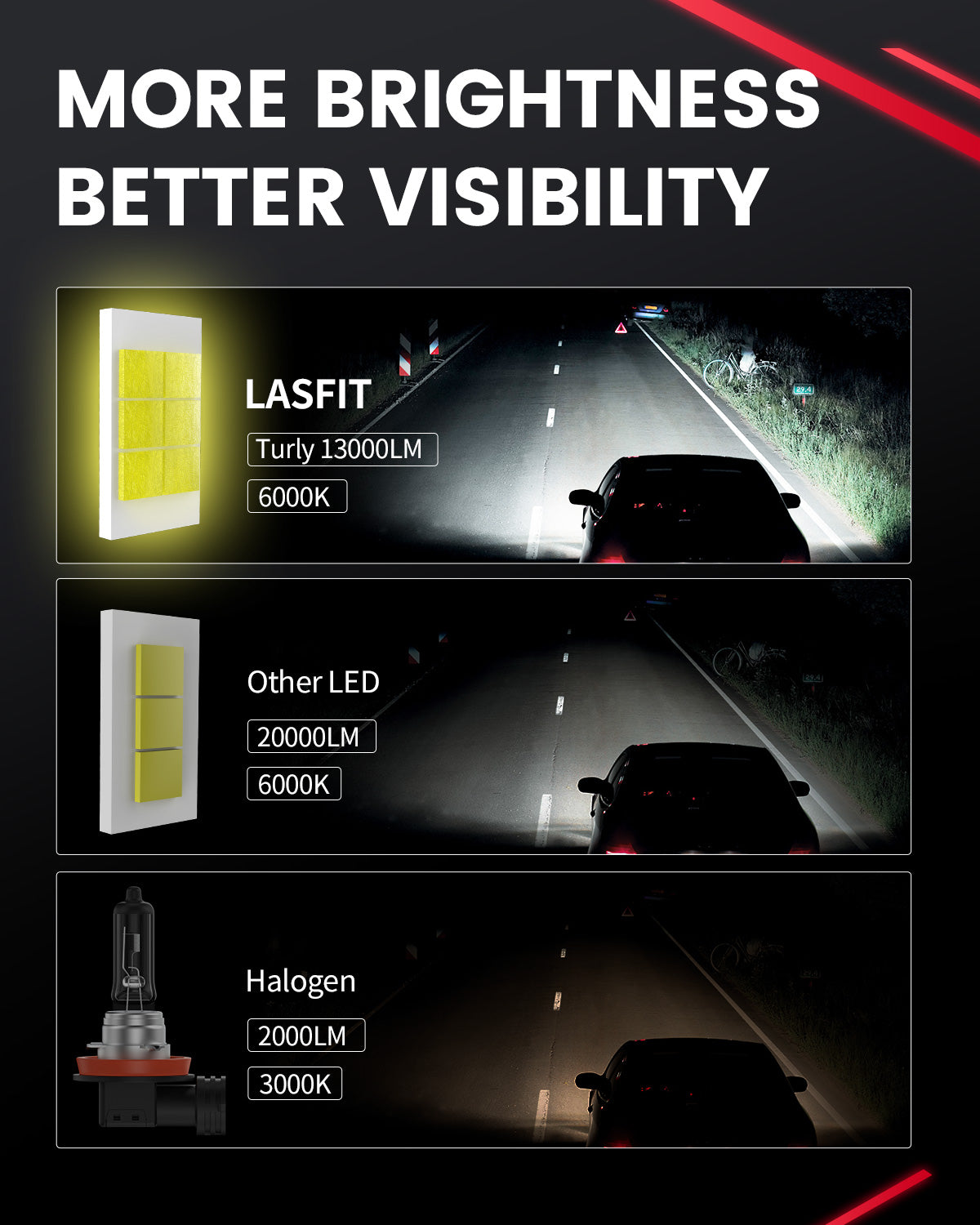
2. Advanced Dual Cooling Systems
Heat management is critical for LED longevity, and LASFIT addresses this with proprietary dual cooling technology. Their bulbs combine copper baseplates, copper heat pipes, and dual ball-bearing fans to dissipate heat efficiently. The turbo-fan cooling system integrated into the dust cover further ensures stable performance, even in extreme conditions. This design prevents overheating and extends bulb life to 30,000+ hours.
3. Plug-and-Play Compatibility
LASFIT’s LED headlights, such as the LS 9005 High Beam Bulbs, are designed as direct replacements for OEM halogen bulbs. They feature CANbus compatibility to avoid error codes on modern vehicles and require no modifications for installation. The flexible socket design allows users to adjust beam patterns with a simple wrench, ensuring precise alignment with reflector or projector housings.
The Lasfit Pro-DC series features custom LED headlight bulbs with extended dust covers designed specifically for select vehicles. They are a perfect fit for OEM headlight housings and offer easy, hassle-free installation.
4. Customized Beam Patterns for Reduced Glare
Unlike generic LED bulbs, LASFIT’s products are tested in OEM headlight assemblies to achieve OEM-like beam patterns with sharp cutoffs. This minimizes glare for oncoming drivers while maximizing road coverage.
5. Rugged Durability and Weather Resistance
Built to withstand harsh environments, LASFIT bulbs are IP67 waterproof-rated and feature dustproof seals. The aluminum housing and polycarbonate lenses ensure resistance to vibration, moisture, and temperature fluctuations, making them reliable for off-road and daily driving alike.
Conclusion: Are LED Headlight Bulbs Right for You?
LED headlight bulbs offer significant advantages over traditional lighting technologies, including superior brightness, energy efficiency, and longevity. While the initial investment may be higher, the long-term benefits often make them the smart choice for most drivers.
When shopping for LED headlights, prioritize quality components, proper cooling, and compatibility with your vehicle. Proper installation is key to maximizing performance and minimizing glare for other road users.
Whether you're looking to improve nighttime visibility, enhance your vehicle's appearance, or simply reduce maintenance, upgrading to LED headlight bulbs can transform your driving experience. With the right bulbs properly installed, you'll enjoy brighter, whiter light that lasts for years of nighttime driving.



